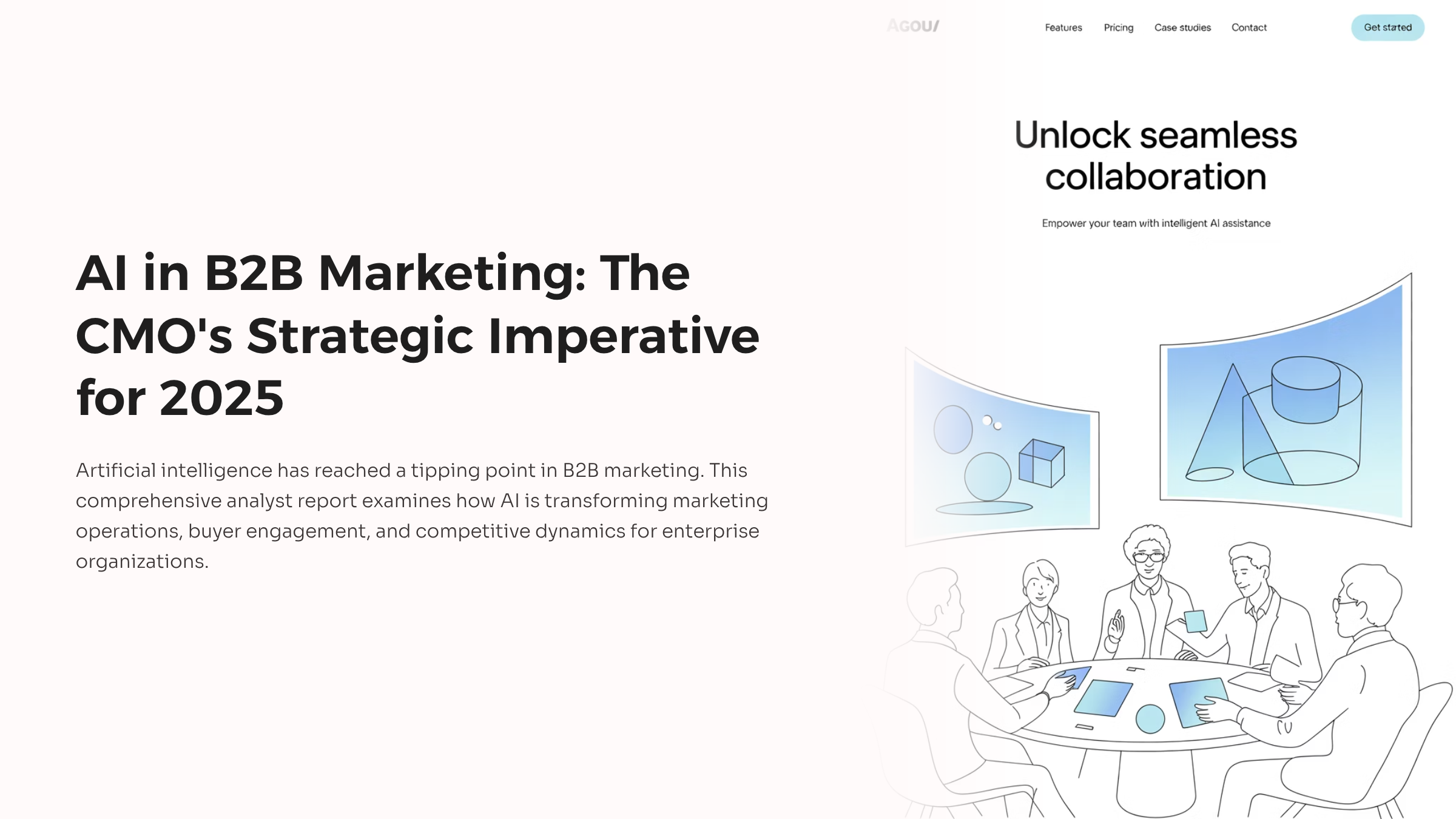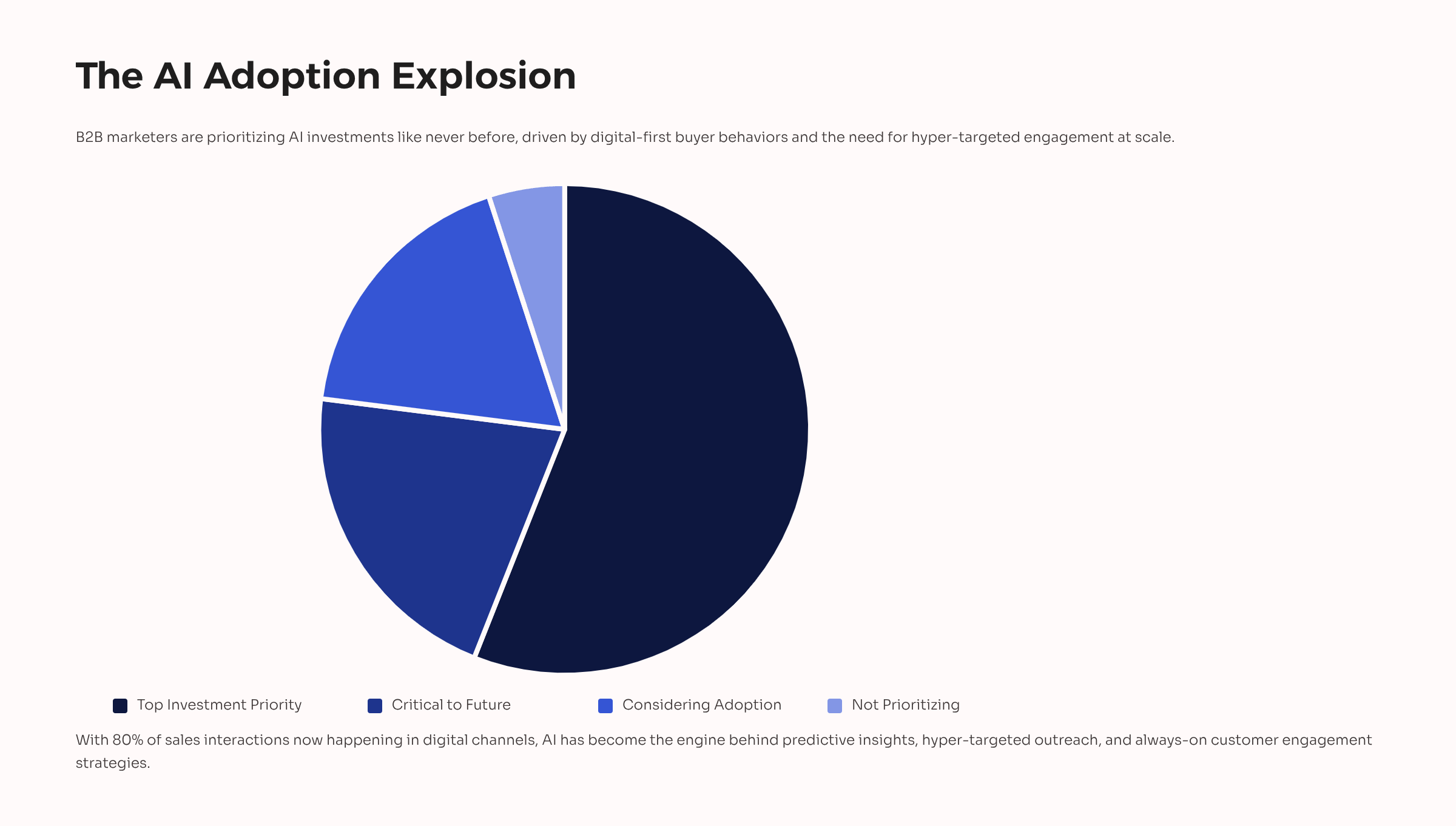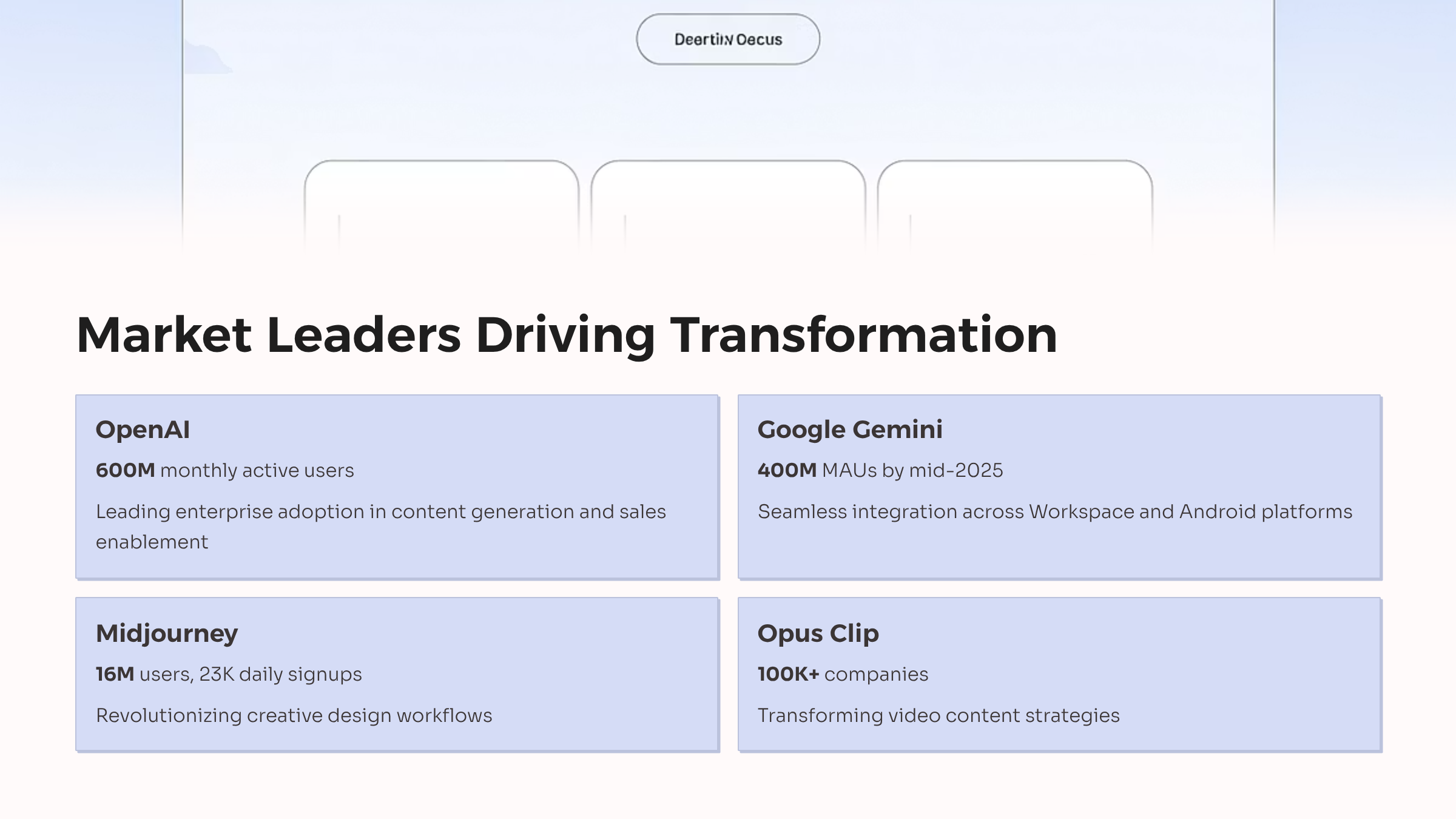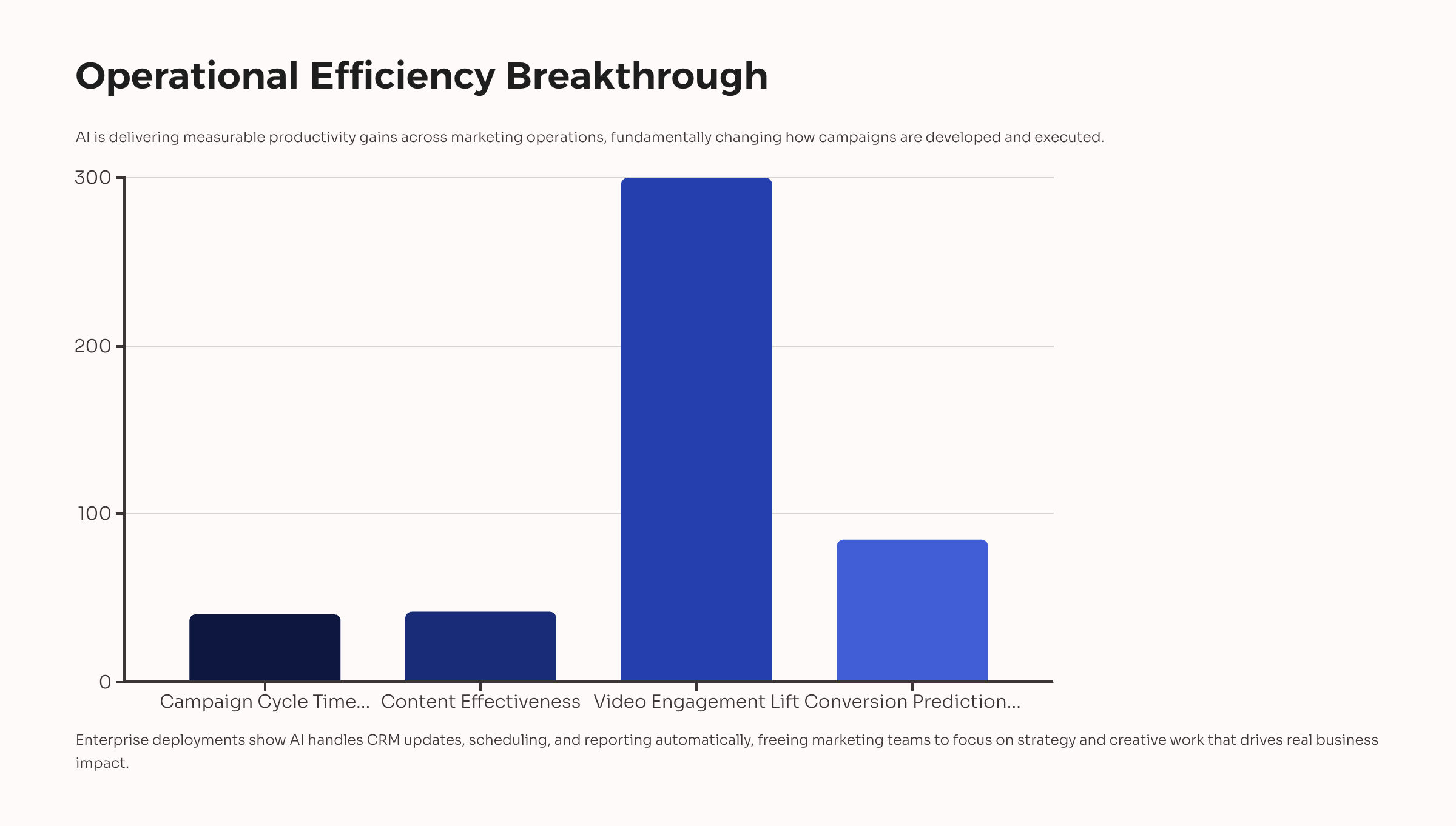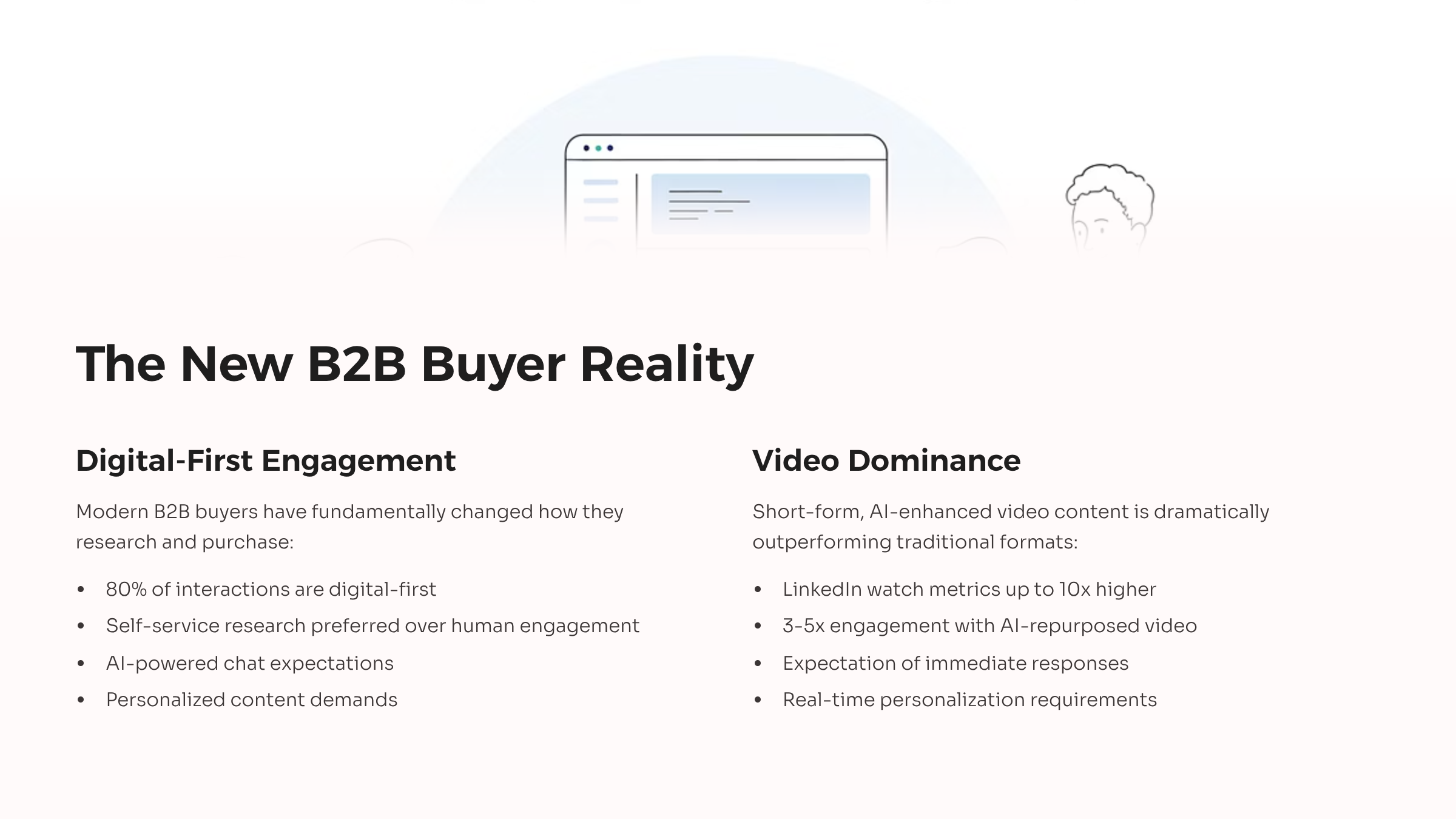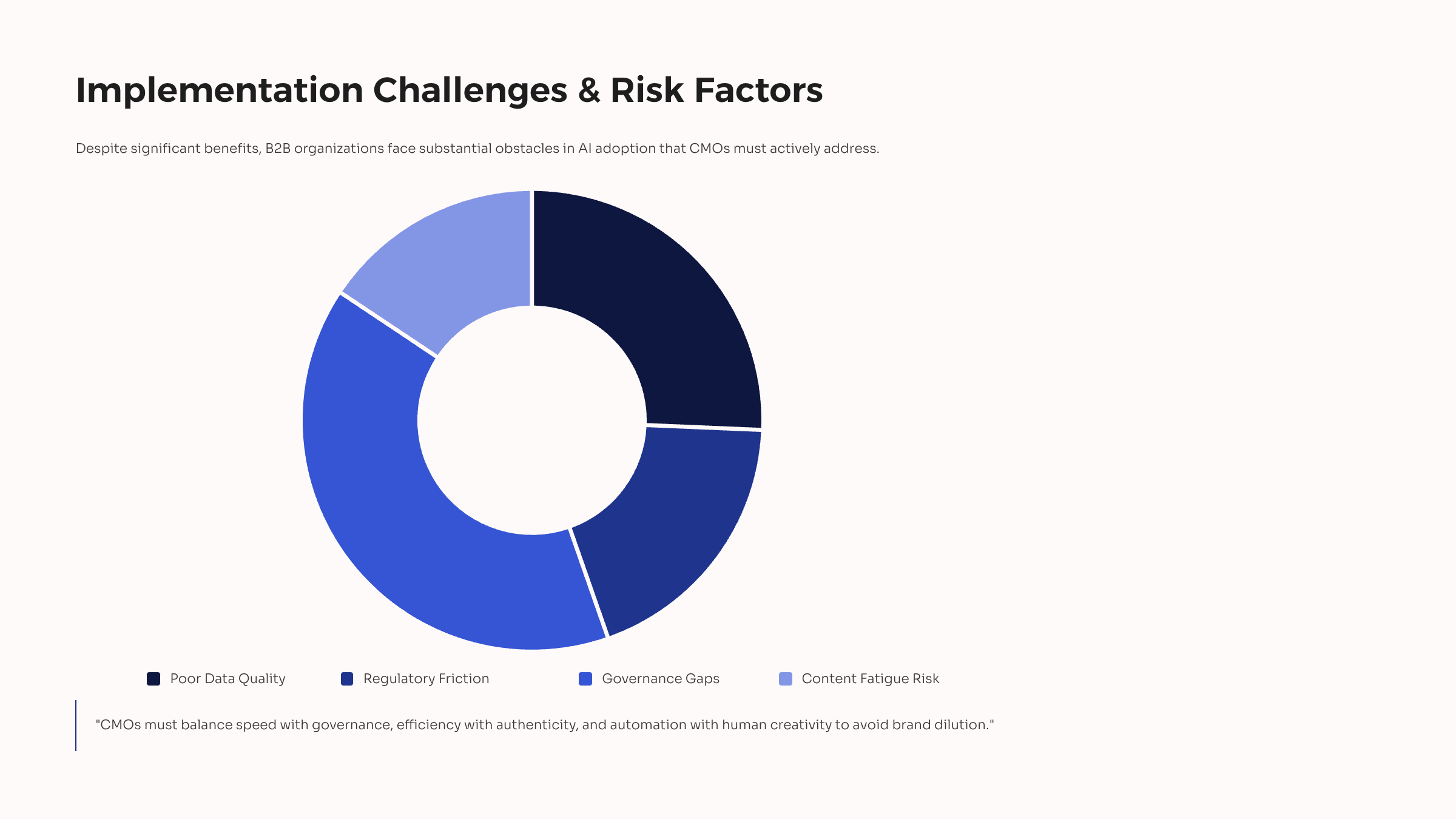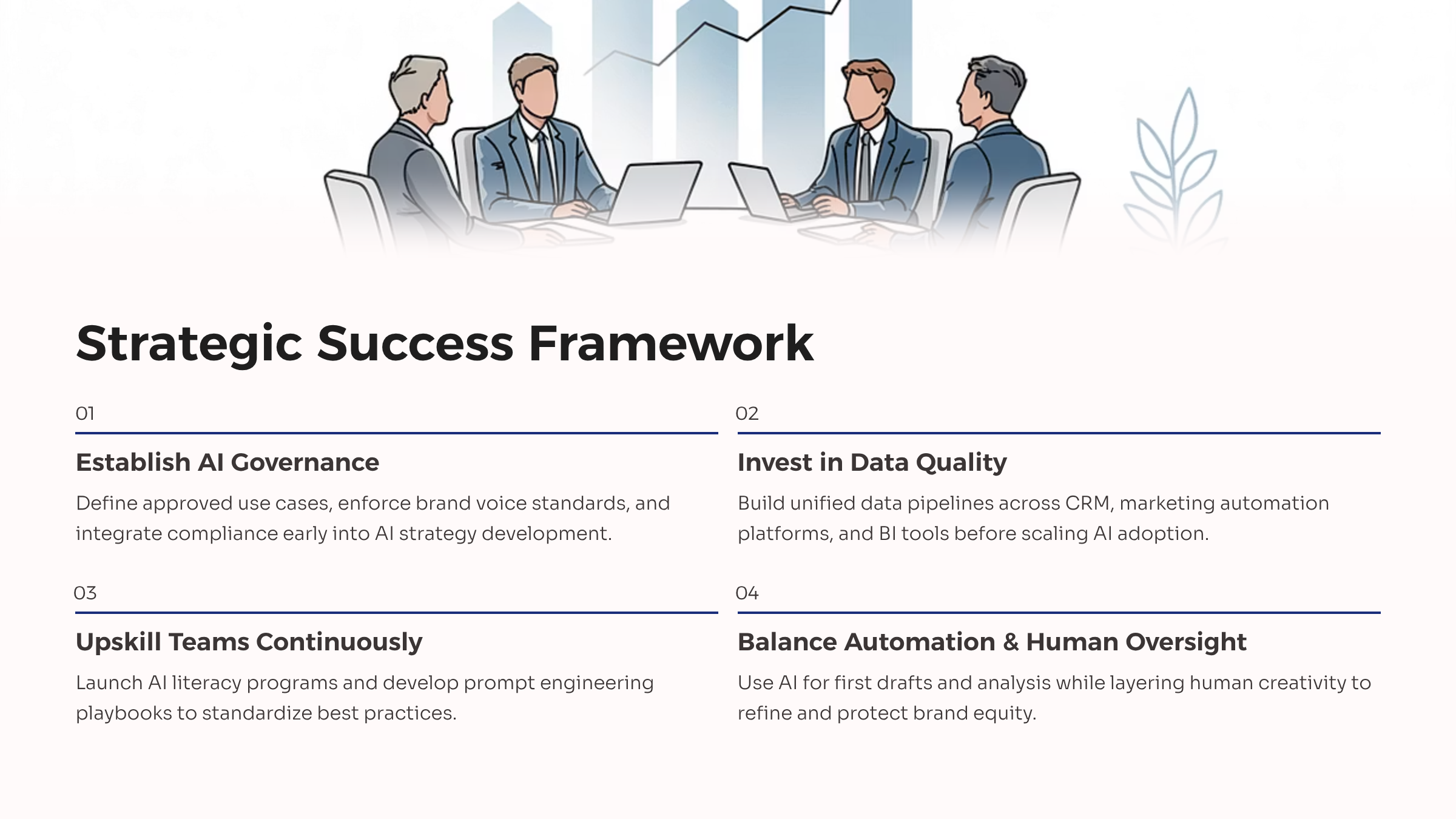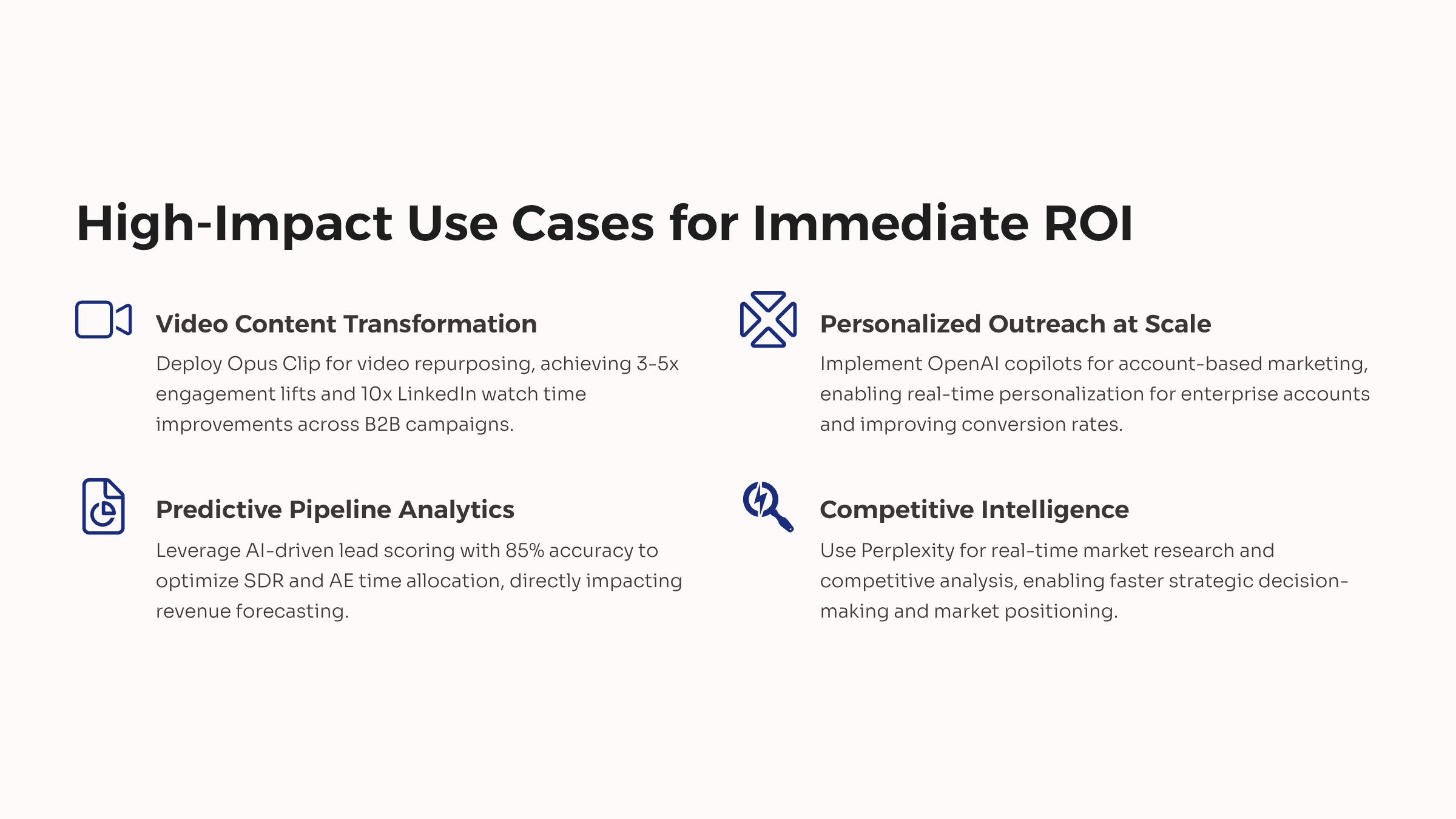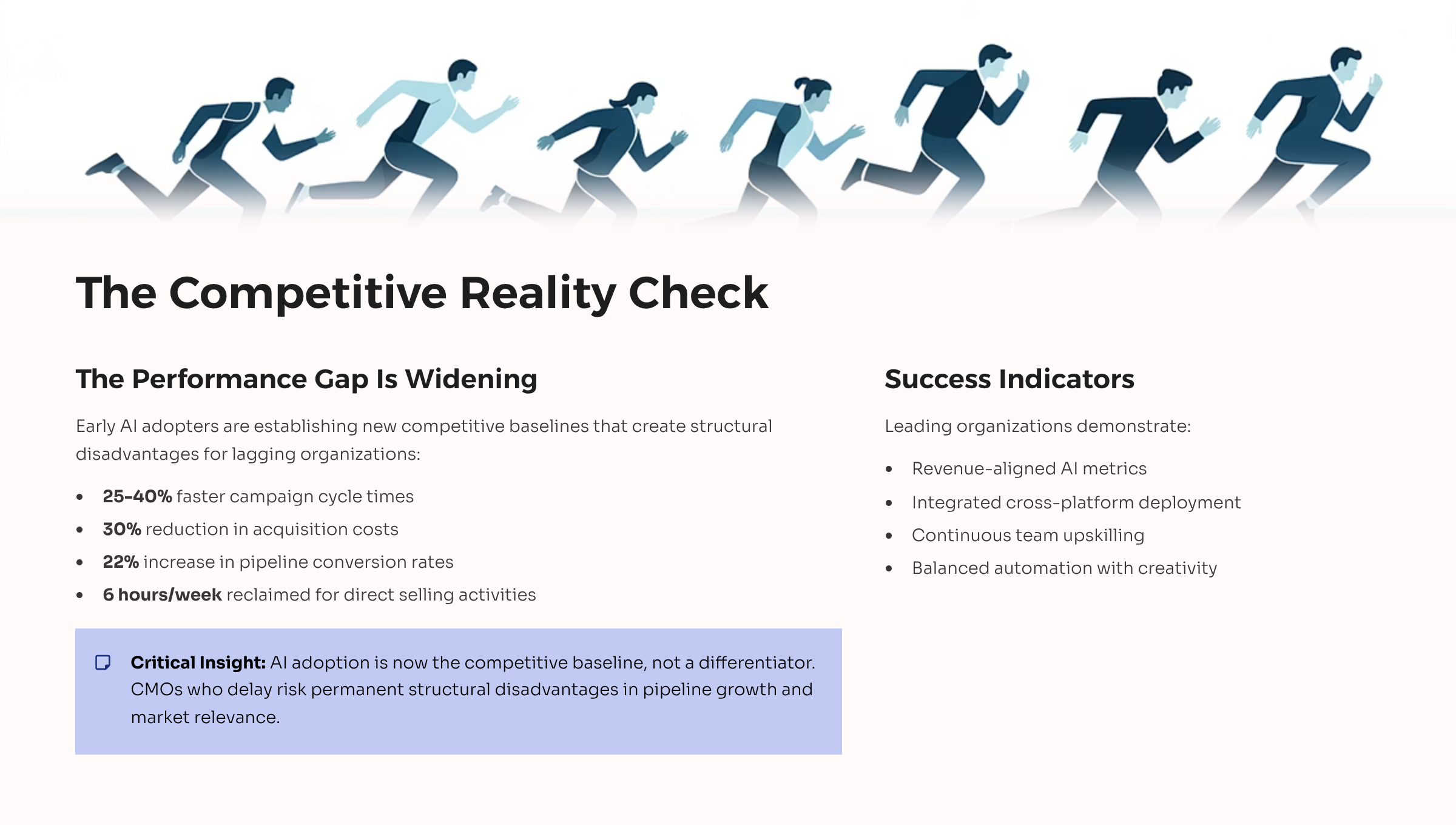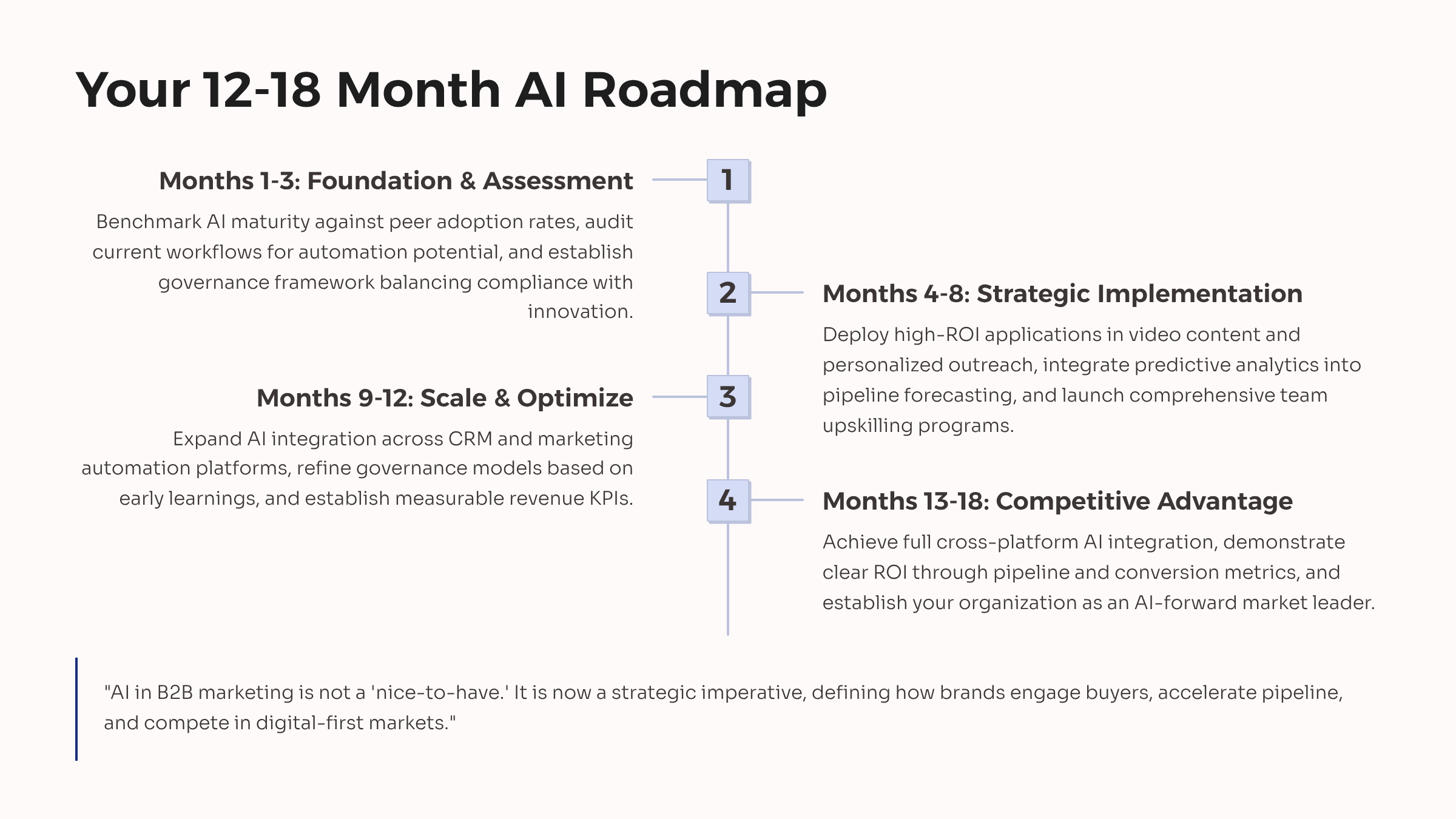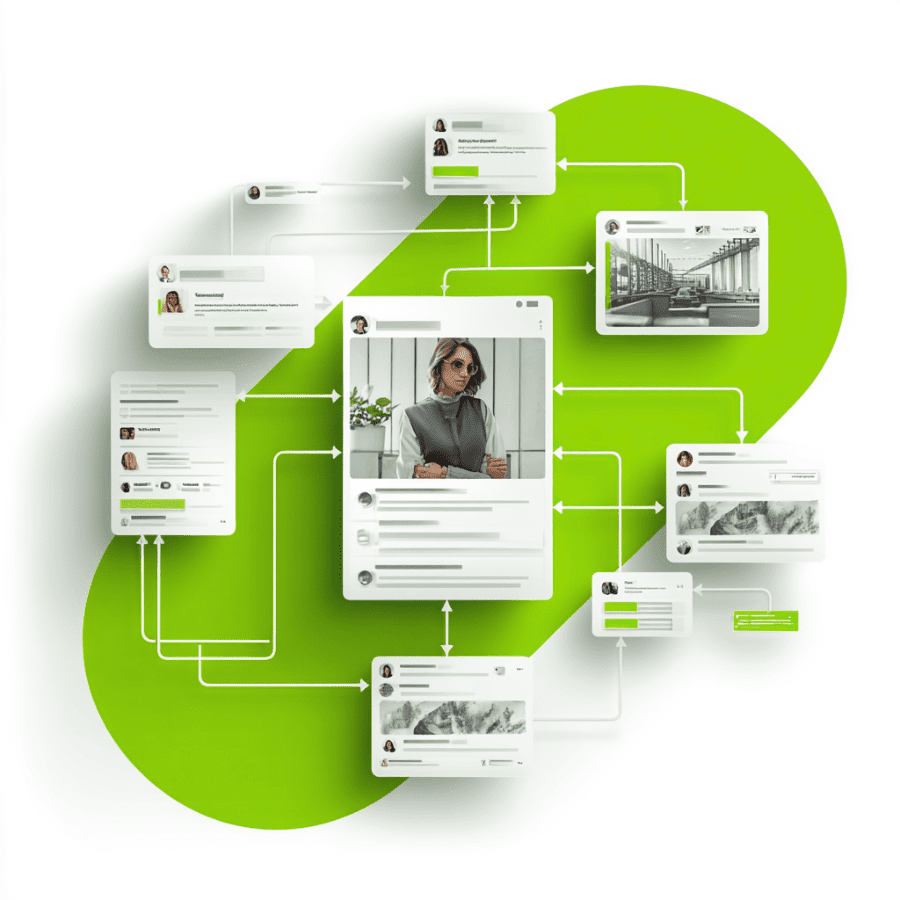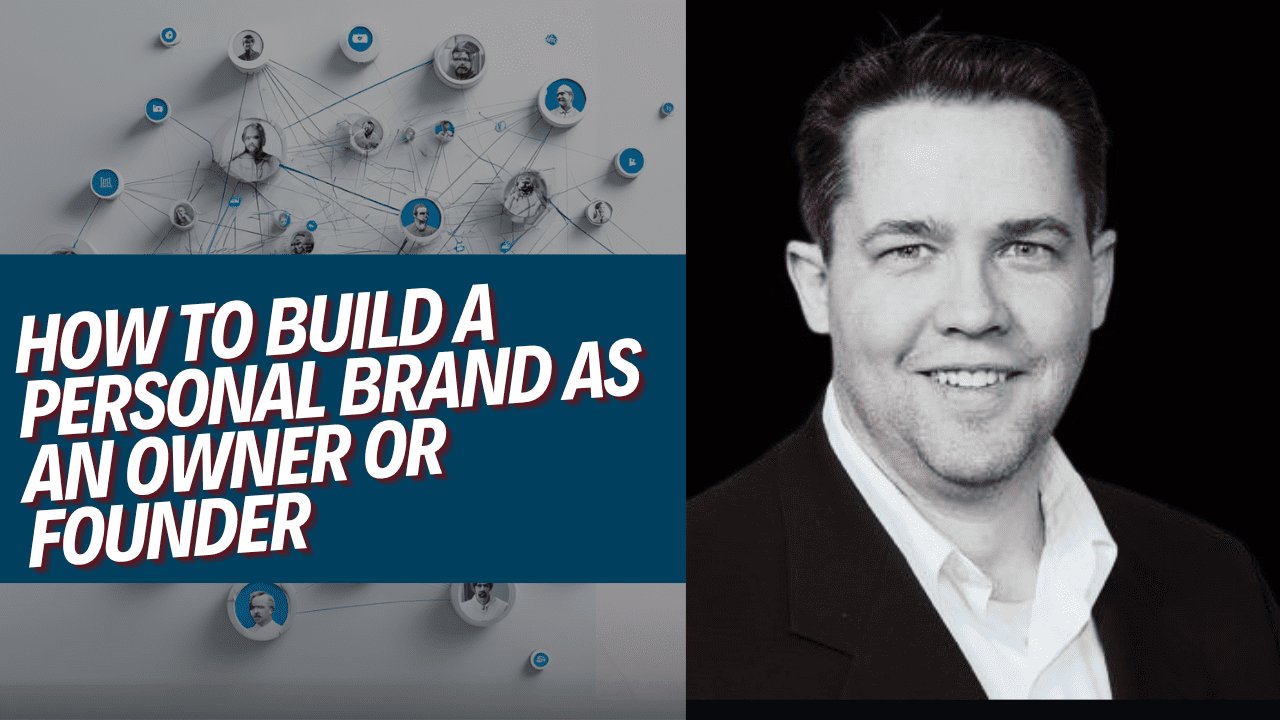Executive Summary
Artificial intelligence has reached a tipping point in B2B marketing. In 2025, 56% of B2B marketers list AI as a top investment priority, and 21% call it critical to their organization’s future. Digital buying behaviors have accelerated this adoption: 80% of sales interactions now happen in digital channels, and AI is the engine behind hyper-targeted outreach, predictive insights, and always-on engagement.
This report analyzes AI’s disruptive influence across B2B marketing and sales, with a focus on five leading tools: OpenAI, Google Gemini, Perplexity, Midjourney, and Opus Clip. We assess adoption rates, use cases, and outcomes, then outline strategic implications for CMOs.
AI-in-B2B-Marketing-The-CMOs-Strategic-Imperative-for-2025Key findings include:
- Operational Efficiency: AI has cut campaign cycle times by 25–40% and reduced manual admin work across CRM, reporting, and scheduling.
- Performance Gains: CMOs report 42% improvements in content effectiveness, and AI-driven video repurposing has produced 3–5x engagement lifts.
- Predictive Accuracy: Conversion prediction models now reach 85% accuracy, transforming pipeline management.
- Market Adoption: OpenAI leads with 600M MAUs, Gemini follows with 400M, while creative platforms like Midjourney (16M) and Opus Clip (>100K firms) fuel content velocity.
But benefits come with risks: 38% of firms struggle with poor data quality, 28% face regulatory friction, and unchecked content automation risks brand dilution. CMOs must balance speed with governance, efficiency with authenticity, and automation with human creativity.
This is not an optional shift. AI adoption is now the competitive baseline. CMOs who lead strategically will create durable advantage; those who delay risk structural disadvantages in pipeline growth, engagement, and brand relevance.
AI in Marketing
The B2B marketing function is undergoing its most significant transformation since the rise of marketing automation a decade ago. AI is not simply another tool in the stack — it is reshaping workflows, buyer engagement, and the skills required to compete.
Why it matters for CMOs:
- Digital-first reality: Buyers are self-directing through digital channels, expecting personalization and speed that only AI can scale.
- Revenue alignment: AI tools are directly influencing conversion rates, forecasting, and upsell opportunities. CMOs now sit at the revenue strategy table, not just brand management.
- Competitive urgency: Firms that master AI adoption are setting new performance baselines. For example, a SaaS firm using OpenAI copilots cut campaign cycle times by 30%, translating into faster market entry and greater pipeline velocity.
The CMO mandate: to guide their organizations through this transition with clarity, ensuring AI adoption drives growth while mitigating risks to compliance, brand, and data trust.
Market Landscape
The Scale of Adoption
AI adoption is accelerating at an unprecedented pace:
- OpenAI: 600M monthly active users, spanning sales, content, and marketing teams.
- Google Gemini: 400M MAUs by mid-2025, integrated into Workspace, Chrome, and Android, making AI usage seamless in daily workflows.
- Perplexity: +12.14% MoM growth, particularly among marketing teams seeking real-time research and competitive analysis.
- Midjourney: 16M users, with ~23K new sign-ups daily, popular among creative and design teams.
- Opus Clip: Adopted by over 100K companies, transforming social video engagement strategies.
These adoption levels signal AI’s normalization — no longer experimental, but embedded into how marketing and sales operate.
Shifting Buyer Behavior
AI aligns with a broader transformation in B2B buyer behavior:
- 80% of interactions are digital-first: Buyers prefer self-service research, AI-powered chat, and personalized content over human-first engagement.
- Video dominance: Short-form, AI-enhanced video is outperforming static content — LinkedIn watch metrics are up to 10x higher with AI-repurposed video.
- Expectation of immediacy: With AI copilots delivering real-time responses, delays in engagement increasingly cost credibility and pipeline.
Competitive Dynamics
- Arms race in efficiency: Firms that master AI-driven productivity gains are lowering acquisition costs and increasing share of voice.
- Compliance as a differentiator: In regulated industries, the ability to deploy AI within compliance guardrails is becoming a competitive edge.
- Talent competition: Firms investing in AI training attract talent that expects to work with next-generation tools.

Key Findings
1. Operational Impact
- Automation of routine tasks: AI now handles CRM updates, scheduling, and reporting. This frees marketing teams to focus on strategy and creative work.
- Cycle-time reductions: Enterprise deployments of OpenAI copilots have shortened campaign development by 25–40%, accelerating time-to-market.
- Productivity lift: Users of Gemini and Perplexity report double-digit productivity gains in research and workflow coordination.
Example: A fintech company integrated AI transcription and CRM enrichment tools. Result: 30% faster deal cycle, with sales reps reclaiming ~6 hours/week for direct selling.
2. Content Velocity & Effectiveness
- Generative AI for content: 42% improvement in measured content effectiveness through better personalization.
- Video transformation: Firms using Opus Clip see 3–5x more engagement and 10x LinkedIn watch time.
- Creative acceleration: Midjourney cuts visual production time from weeks to hours, supporting campaign agility.
Example: A cleantech firm used Midjourney to generate concept visuals for a product launch, reducing design bottlenecks and accelerating multi-channel rollout by three weeks.
3. Predictive Power & Personalization
- Conversion prediction: Predictive analytics now achieve up to 85% accuracy in lead scoring, driving more efficient allocation of SDR and AE time.
- Real-time personalization: AI enables account-based marketing at scale, dynamically tailoring outreach for enterprise accounts.
Example: A SaaS provider layered AI-driven predictive scoring into its ABM platform, leading to a 22% increase in pipeline conversion within two quarters.
4. Challenges & Risks
- Data dependency: 38% of B2B firms report poor insights due to siloed or inconsistent CRM/marketing data.
- Content fatigue risk: Overproduction from AI risks audience disengagement. Several CMOs report declining engagement when volume rises without human oversight.
- Governance gaps: 59% of firms acknowledge a need for ongoing AI upskilling, yet few have formalized governance models.
- Compliance: 28% of B2B orgs in regulated sectors face data provenance scrutiny, adding friction to adoption.

150 Stats on AI for B2B Marketing
- 71% of organizations now use generative AI (GAI) in at least one business function.1827marketing
- 42% of companies use GAI specifically in marketing and sales.1827marketing
- 85% of marketers use AI for content creation, with 83% reporting increased productivity.1827marketing
- 49% of marketers report gains in content quantity after implementing AI tools.1827marketing
- 50% report saved time through AI, often more than five hours per week.1827marketing
- 52% of marketers say human-AI collaboration improves content quality.1827marketing
- 55% of marketers have high levels of trust in AI-generated content, but 67% maintain only medium trust.1827marketing
- Only 27% of organizations review all AI-generated content before publishing.1827marketing
- 30% say less than 20% of AI-generated content is checked before use.1827marketing
- Nearly 90% of marketers use generative AI tools at work, 20% use them daily.1827marketing
- 38% of marketers use AI for writing projects, 33% for general content, 28% for visual storytelling.1827marketing
- 28% use AI for design, editing, and brainstorming, 22% for data analysis, and 19% for research.1827marketing
- ChatGPT and similar tools are used by 62% of marketing professionals.1827marketing
- Grammarly is used by 58% of marketers as a writing enhancer.1827marketing
- Canva, Microsoft Copilot, and other platforms with built-in AI are used by 52%.1827marketing
- Visual content generators (Midjourney, DALL·E, etc.) are used by 45%.1827marketing
- 84% say AI has improved speed in content delivery, with 29% reporting significant improvement.1827marketing
- 49% said AI helps produce more content for less cost, especially in resource-strapped teams.1827marketing
- 75% believe using AI gives a competitive edge to their marketing strategies.1827marketing
- 26% report greater content success when AI is involved.1827marketing
- 38% say AI-assisted content is at least as effective as human-only content.1827marketing
- 75% use AI to brainstorm and ideate new campaign ideas.1827marketing
- 60% of B2B leaders expect AI to reshape lead identification; 53% anticipate better personalized outreach.1827marketing
- Only 33% of marketers currently use AI for campaign personalization.1827marketing
- 30% rank personalization as a top benefit of AI, but more cite productivity and cost savings.1827marketing
- 24% report more time for customer relationship-building because of AI efficiencies.1827marketing
- 26% say better data analysis is a major AI benefit.1827marketing
- McKinsey reports AI can reduce acquisition costs by 50%, boost revenue by 15%, and increase ROI by 30%.1827marketing
- Companies like Vanguard using AI-sourced personalization saw LinkedIn ad conversion rates grow by 15%.1827marketing
- Multimodal content creation via AI: 36% of companies use it for images, 13% for video and audio content.1827marketing
- 1 in 4 marketers plan to leverage AI for multimodal campaigns in 2025.1827marketing
- 63% of organizations use AI for text, 27% for code generation, 13% for voice/music and video.1827marketing
- UBS aims to produce 5,000 AI avatar videos per year versus 1,000 human-made videos.1827marketing
- 54% of teams are experimenting with AI rather than integrating into daily workflows.1827marketing
- Only 19% have fully embedded AI in everyday marketing operations.1827marketing
- 54% of marketers feel overwhelmed by AI implementation and workflow changes.1827marketing
- Only 21% of businesses have redesigned some workflows around AI.1827marketing
- 1% of company executives describe their generative AI adoption as “mature”.1827marketing
- 40% of marketers cite “robotic” output as a potential downside of AI-generated content.1827marketing
- 34% worry about plagiarism from AI tools, 32% about inaccuracy, 31% about security and privacy, 29% about quality loss.1827marketing
- 24% fear AI will hinder creativity in their marketing.1827marketing
- For non-adopters, accuracy concerns top the list at 35%.1827marketing
- 28% of non-users face corporate restrictions on AI; 26% fear copyright risks.1827marketing
- 38% of organizations have formal AI content and governance guidelines.1827marketing
- 23% have specific marketing team guidelines for AI.1827marketing
- 78% of those with guidelines cover acceptable use cases.1827marketing
- 66% cover security, and 66% outline unacceptable use.1827marketing
- 64% have protocols for data handling in AI platforms.1827marketing
- 48% require transparency around AI-generated content.1827marketing
- 47% address legal and copyright, while only 29% address bias issues.1827marketing
- 43% of organizations cite lack of AI skills as a main implementation barrier.1827marketing
- 39% marketers train themselves in AI; 15% report no formal or informal training at all.1827marketing
- 55% of organizations now provide some AI learning opportunities for their teams.1827marketing
- AI skills are the fastest-growing professional development area on LinkedIn in 2025.1827marketing
- Generative AI training is now the top digital skill being taught in Q1 2024.1827marketing
- 88% of tech firms use GAI in business functions, with 80% in professional services and advanced industries.1827marketing
- Media and telecoms have 79% GAI adoption rates, consumer goods 46%, financial services 40%, energy 33%, healthcare 29%.1827marketing
- 56% of B2B marketers rate AI as high priority for 2025 tech investments.1827marketing
- Only 1% say AI is low priority, and 11% say it’s not a priority at all.1827marketing
- Weekly GAI use by execs rose from 37% in 2023 to 73% in 2024.1827marketing
- 82% of businesses view GAI as “critical” to future strategy and reinvention.1827marketing
- 21% describe their AI maturity as “low”; most are at the experimental stage.1827marketing
- 75% of GAI value in business comes from just four areas: customer ops, software, R&D, and marketing/sales.1827marketing
- GAI increases marketing productivity an estimated 5–15% of overall spend.1827marketing
- Sales productivity rises by 3–5% of total global sales spend thanks to GAI.1827marketing
- 29% of marketers report significant speed increases in campaign delivery with AI.1827marketing
- 52% say their content quality improved through combined human-AI creations.1827marketing
- 30% state AI improves campaign ideation significantly.1827marketing
- 67% report medium trust in GAI outputs for both insights and creative work.1827marketing
- Most AI content is reviewed only in part, raising governance concerns.1827marketing
- AI’s perceived competitive advantage is gaining among mid-market and enterprise teams.1827marketing
- AI cut time-to-market for new offers and campaigns by 15–40% at large firms.1827marketing
- Companies integrating OpenAI tools report double-digit growth in lead capture rates.linkedin
- Google Gemini boosts document summarization productivity by up to 60% across Workspace users.dig
- Midjourney adoption rates in B2B creative teams grew by 19% YoY.brandwell
- Opus Clip repurposing increased social video engagement by 3–5x on LinkedIn.rickkoleta
- Perplexity’s user base expanded by 12.14% month-over-month in H1 2025.marketingguys
- AI-enabled marketing teams report 42% higher engagement rates in personalized outreach.linkedin
- 28% of B2B orgs in regulated sectors now have stricter data provenance controls on AI outputs.1827marketing
- B2B marketing teams using agentic AI see up to 30% improvement in sales win rates.bain
- Sales productivity increases mostly come from AI automating non-selling tasks, giving teams 2x more customer time.bain
- Only 19% of marketing teams have AI fully integrated into day-to-day workflows—the rest are stuck in pilot mode.1827marketing
- Companies that invest in top-down AI strategy outperform by 22% in marketing efficiency.bain
- 25% of marketers worry that AI puts their job security at risk and need change management support.1827marketing
- 75% of marketers rely on consumer apps for AI—organizational adoption lags personal use and best practices.1827marketing
- The bulk of AI failures are due to poor data, lack of integration, and underinvested training rather than technology limits.bain
- 87% of senior execs believe AI-integrated customer journeys will deliver measurable business returns by the end of 2025.business.adobe
- Nearly 85% of leading B2B marketers use AI to enhance content effectiveness and engagement.business.adobe
- AI helps marketers achieve real-time, personalized engagement with buying groups and accounts.business.adobe
- 81% of marketers expect AI will accelerate delivery of customized journeys faster than traditional workflows.business.adobe
- 63% report improvements in buyer journey mapping due to AI-powered insights.m1-project
- 77% of B2B brands deploy AI for automation in campaign orchestration.m1-project
- Automated content optimization through AI increases audience relevance in 73% of campaigns.m1-project
- Companies using AI for sales predict a 40% higher conversion rate vs. manual-only approaches.business.adobe
- 80% of sales interactions in B2B will take place in digital channels by 2025, enabled by AI.m1-project
- Predictive analytics from AI raise campaign performance by up to 25%.m1-project
- McKinsey finds companies with advanced AI personalization generate 40% more campaign revenue.m1-project
- 54% of AI-driven B2B campaigns integrate brand and activation signals for sustainable growth.m1-project
- AI tools like M1-Project can identify microsegments generating 60% of company revenue, which sales intuition missed.m1-project
- AI-led operating models reduce CAC by up to 17% and raise opportunity creation by 13% in two quarters.m1-project
- AI-driven targeting can lift campaign CTR by up to 72%.m1-project
- Segmented AI-powered campaigns deliver 14% higher open rates, 101% higher click rates vs. non-targeted.m1-project
- ICP generators using revenue data surface segments that beat baseline win rates by 20% or more.m1-project
- Weekly creative refreshes using AI content scoring stabilize CAC and boost meeting-to-opportunity rates.m1-project
- AI automation in B2B saved marketing staff 3–7 hours per week on repetitive tasks.m1-project
- Companies using AI journey mapping see a 17% rise in customer satisfaction scores.m1-project
- AI-generated social content leads to 25% more webinar attendance than human copy.m1-project
- Personalized AI-driven recommendations increase email campaign engagement by an average of 19%.m1-project
- Account-based programs using AI to identify and score key decision-makers improve conversion rates by 14%.m1-project
- 36% of companies use multimodal AI tools for image generation, 13% for video/audio content.m1-project
- HubSpot reports a 20% increase in lead conversions after integrating AI-driven predictive analytics.m1-project
- AI in competitor analysis enables real-time tracking of rivals for 57% of B2B orgs, up from 34% in 2023.m1-project
- 68% of marketers now automate social media scheduling with AI-based tools.m1-project
- Automated audience segmentation by AI increased targeting accuracy by 32%.m1-project
- 39% of teams use AI-powered platforms to continuously refresh creative and copy in campaigns.m1-project
- Predictive analytics enable marketers to reallocate budget to high-value audiences weekly, optimizing spend.m1-project
- 28% of B2B marketers use AI chatbots for lead qualification; those who do report a 19% time savings.m1-project
- Marketing teams using AI-driven ICP models increase time spent on high-potential accounts by 21%.m1-project
- Real-time campaign performance monitoring with AI enables daily adjustments for 53% of B2B teams.m1-project
- Content powered by AI in every ICP segment tests 42% higher for relevance in customer surveys.m1-project
- AI tools surface “hidden” segments that sales teams missed, driving 13% more pipeline growth.m1-project
- Incremental pipeline created through AI-driven audience economics averages 18% quarterly gain.m1-project
- Brands using AI for web personalization lift site engagement by a median 22%.m1-project
- GDPR compliance solutions using AI save B2B teams 11+ hours per month in data management.m1-project
- AI-driven ad buying yields 25% more conversions at similar budgets for targeted B2B leads.m1-project
- Most AI-powered B2B marketing journeys adapt in real time based on buyer committee activity.m1-project
- 45% of marketers say AI-enabled predictive metrics inform next-quarter budget planning.m1-project
- Automating campaign orchestration with AI lets teams pause underperforming creatives weekly for a 27% spend boost to winners.m1-project
- AI-based pain point detection in journey mapping increases campaign relevance by 20%.m1-project
- Intent-led segmentation by AI reduces ad spend wastage by 15%.m1-project
- Creative rotation optimized by AI led to a 17% reduction in cost-per-opportunity for European cybersecurity vendor.m1-project
- AI-enabled customer journey analytics boost NPS by an average of 13 points.m1-project
- Machine learning-based pacing in campaign scheduling increases activation response rates by 24%.m1-project
- 84% of AI-driven marketing teams use predictive signals for channel selection.m1-project
- AI-orchestrated LinkedIn targeting delivers 2.1x lift in ad interaction rates for B2B.m1-project
- Companies with AI-powered engagement scoring see a 19% jump in customer retention for large accounts.m1-project
- AI named as critical to 2025 B2B marketing success by 67% of strategists.business.adobe
- First-party data integration projects using AI yield 33% better account insights.m1-project
- AI-equipped teams move 37% faster from plan to pipeline in quarterly sprints.m1-project
- Real-time AI feedback on creative hooks reduces low-performing content by 28% quarter-over-quarter.m1-project
- Marketing analytics dashboards with AI saved 16% in reporting cost for enterprise B2B.m1-project
- Persona modeling with AI improves campaign fit and message resonance by 18%.m1-project
- Next-best-action recommendations powered by AI boost cross-sell/up-sell rates by 14%.m1-project
- AI-based opportunity scoring increases win rates by 12% compared to human-only.m1-project
- Dynamic journey maps powered by AI keep campaign “freshness” scores above 85% throughout quarter.m1-project
- 73% of B2B marketers say AI makes outcome prediction more reliable for campaign testing.business.adobe
- 61% see increased pipeline velocity after switching to AI-generated account targeting.m1-project
- Automated MQL scoring lets sales teams respond 48% faster to hot prospects.m1-project
- 79% of marketers using AI for social listening report better trendspotting for campaign ideas.m1-project
- Machine learning increases optimal creative rotation frequency for 42% of B2B orgs.m1-project
- Predictive lead scoring by AI decreases rejection rates by 16%.m1-project
- ABM programs enriched with AI increase key account penetration rates by 9%.m1-project
- Companies using AI-powered feedback loops achieve continuous optimization without manual review.m1-project
- AI-guided campaign planning increases accuracy in outcome forecasting by 23%.m1-project
- AI-driven audience expansion tools grow qualified top-funnel leads by 28% in quarter.m1-project
- Behavioral analytics via AI improve targeting models for 61% of B2B marketers.m1-project
- Campaigns monitored with real-time AI signals see a median 21% gain in engagement.business.adobe
- Nearly half of B2B orgs plan to increase AI investment by more than 10% next year.business.adobe
- AI-generated creative outperforms manual versions in 38% of head-to-head tests for campaign engagement.m1-project
- Data-driven account scoring by AI delivers 15% higher upsell rates on average.m1-project
- Companies using AI for segment-based social content see 37% more follower growth.m1-project
- AI-powered sales forecasting shortens quota planning cycles by 21%.business.adobe
- Real-time adaptive journeys built with AI boost account engagement 2x in pilot programs.business.adobe
- AI solution adoption correlates with 33% better marketing budget efficiency.m1-project
- Machine learning-driven topic detection increases relevancy scores by 17% for content campaigns.business.adobe
- Marketing teams integrating AI report 44% lower abandoned cart rates in B2B e-commerce.business.adobe
- Over 80% of execs anticipate a measurable ROI from AI journey mapping and content automation by end of year.business.adobe
- Silo-busting data projects led by AI shorten analytics cycles by 26%.business.adobe
- AI-driven cross-channel attribution increased understanding of account journeys by 30%.business.adobe
- Enterprises using AI-led orchestration cut campaign deployment time by 28%.business.adobe
Implications for CMOs
- Strategic risk of falling behind: Early adopters are raising competitive baselines in productivity and engagement. Lagging firms risk widening performance gaps.
- Integration pressure: AI is most effective when integrated across CRM, marketing automation, and sales enablement platforms — piecemeal adoption underdelivers.
- Revenue accountability: CMOs must demonstrate AI’s impact on pipeline, conversion, and cost efficiency — not just “innovation for innovation’s sake.”
- Cultural shift: AI requires teams to rethink workflows, creativity, and measurement. This is as much a change management challenge as a technology one.
Recommendations for CMOs
- Establish AI Governance and Guardrails
- Define approved use cases and prohibited scenarios.
- Enforce brand voice standards for generative outputs.
- Integrate compliance/legal early into AI strategy.
- Invest in Data Quality & Integration
- Build unified data pipelines across CRM, MAP, and BI tools.
- Audit existing data for quality issues before scaling AI adoption.
- Tie predictive models to revenue metrics for CFO alignment.
- Upskill Teams Continuously
- Launch AI literacy programs for marketing and sales teams.
- Develop “prompt engineering playbooks” to standardize best practices.
- Create hybrid roles blending marketing expertise with AI fluency.
- Balance Automation with Human Oversight
- Use AI for first drafts, personalization, and analysis.
- Layer human creativity to refine, differentiate, and protect brand equity.
- Monitor for signs of audience fatigue in automated channels.
- Focus on High-ROI Applications
- Prioritize video (via Opus Clip) and personalized outreach (via OpenAI copilots).
- Expand predictive analytics in pipeline forecasting.
- Use AI research platforms like Perplexity to sharpen competitive strategy.
AI is no longer peripheral — it is becoming the strategic core of B2B marketing. The winners in 2025–26 will be CMOs who:
- Treat AI as a revenue driver, not just a marketing tool.
- Invest in data and governance as much as tools themselves.
- Upskill teams to work in partnership with AI.
- Use AI for both productivity and differentiation, not just scale.
Next steps for CMOs:
- Benchmark your firm’s AI maturity against peer adoption rates.
- Audit current workflows for automation potential.
- Define a governance framework that balances compliance and innovation.
- Set 12–18 month KPIs tying AI to measurable revenue outcomes.
The shift is clear: AI in B2B marketing is not a “nice-to-have.” It is now a strategic imperative, defining how brands engage buyers, accelerate pipeline, and compete in digital-first markets.
Featured Videos from Learning Paths
One quick watch from each curated path.



